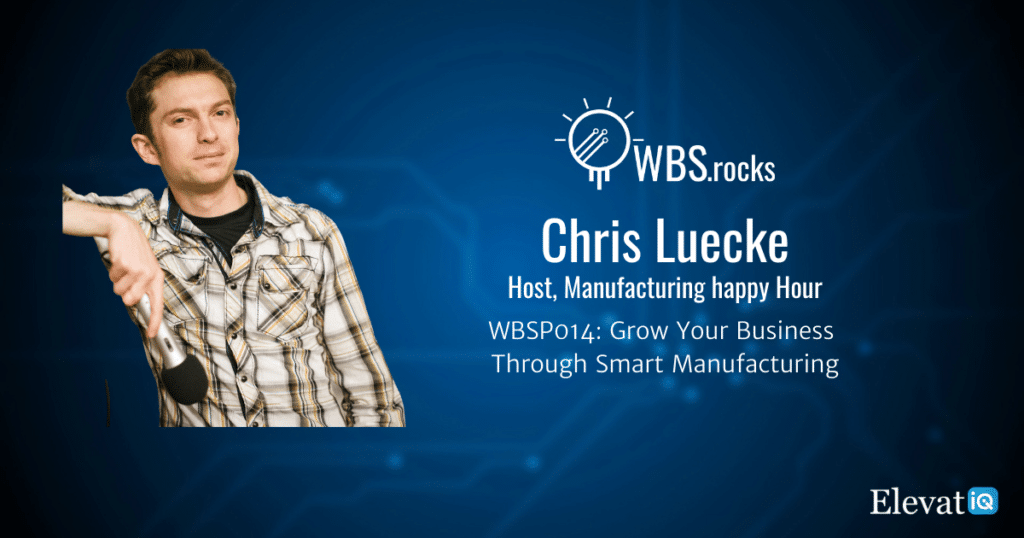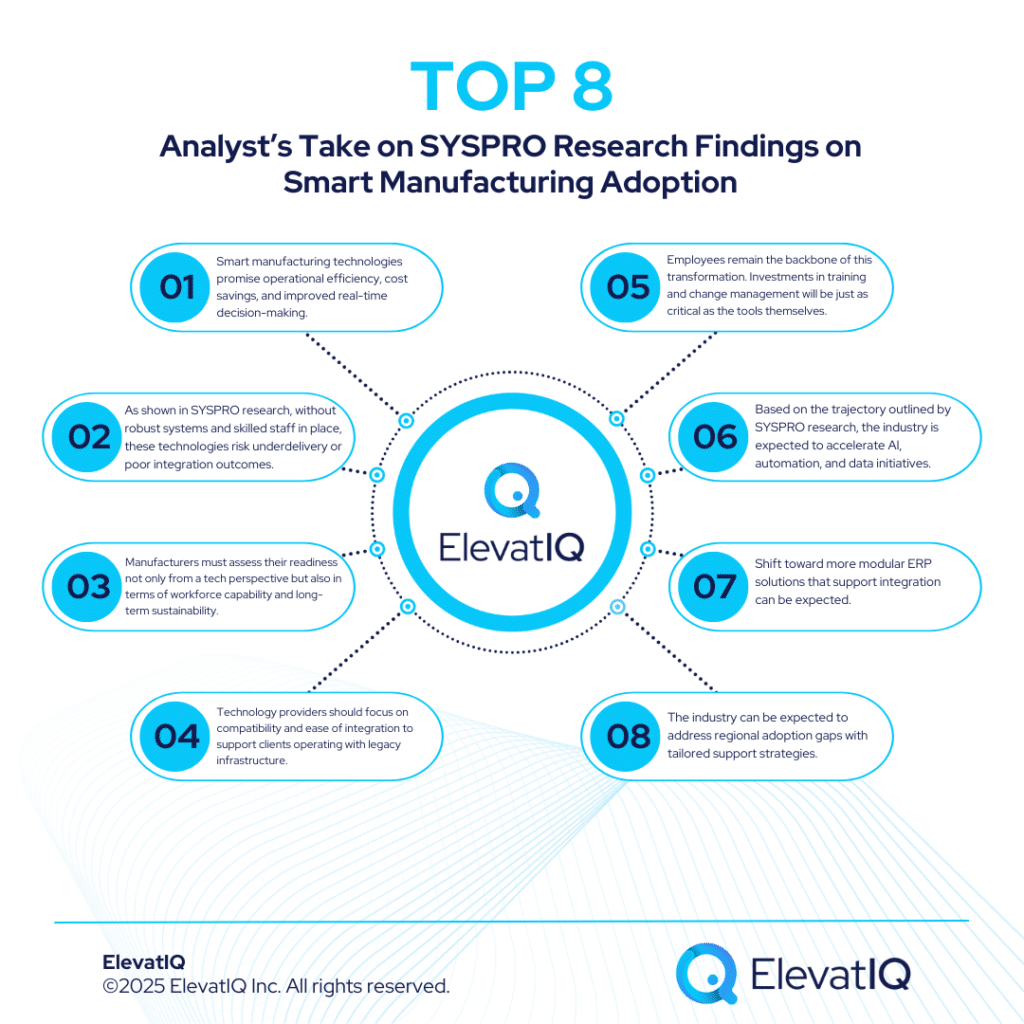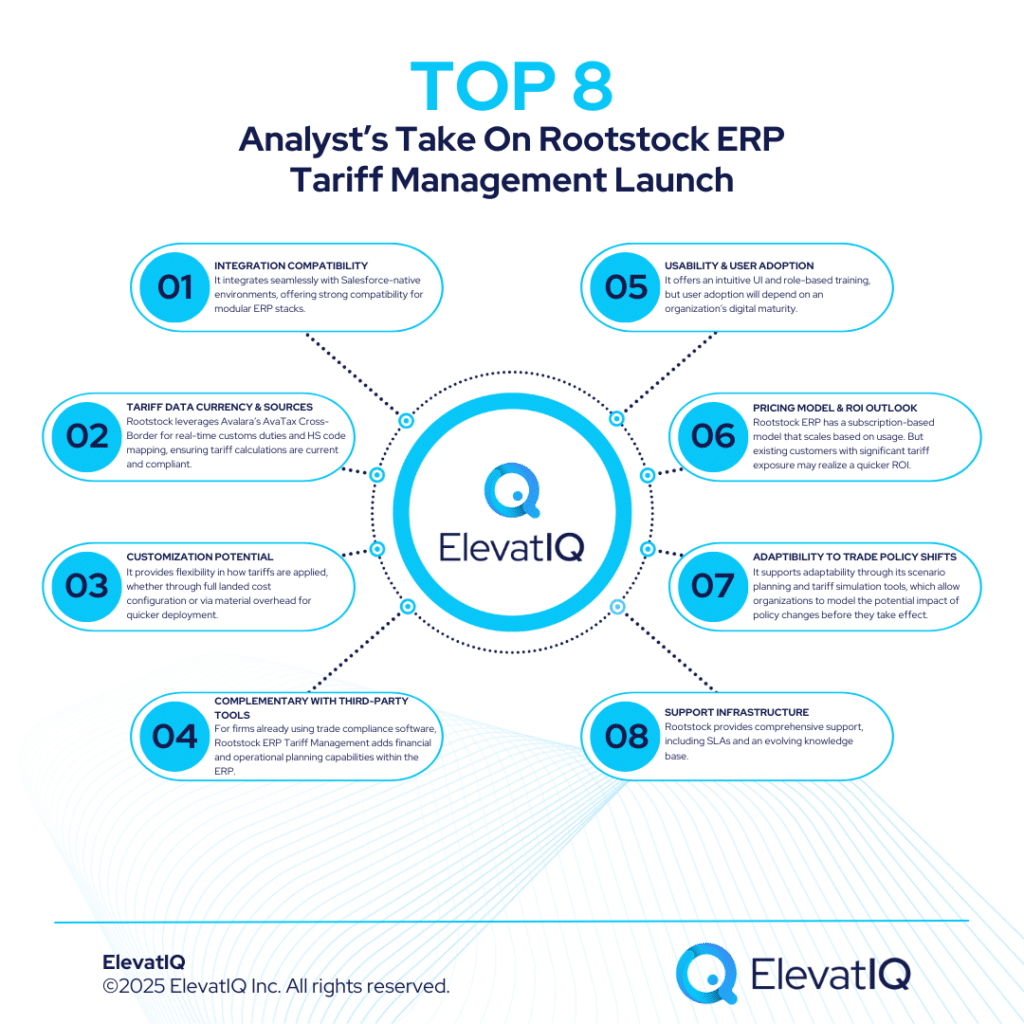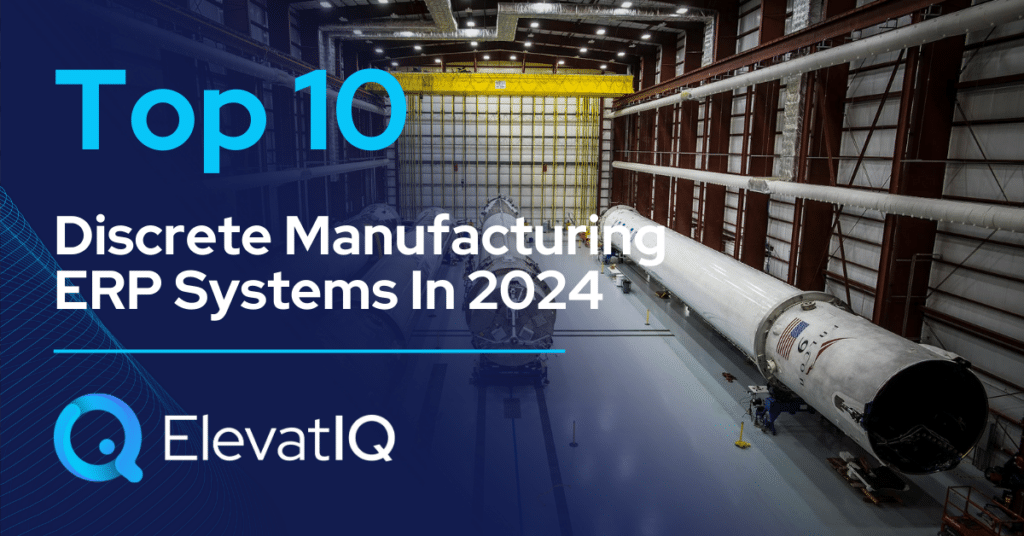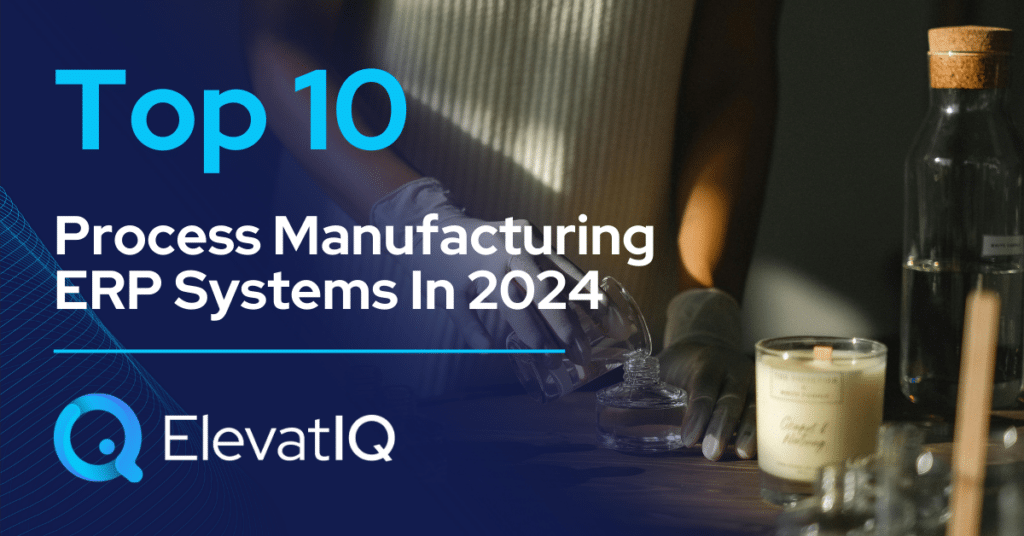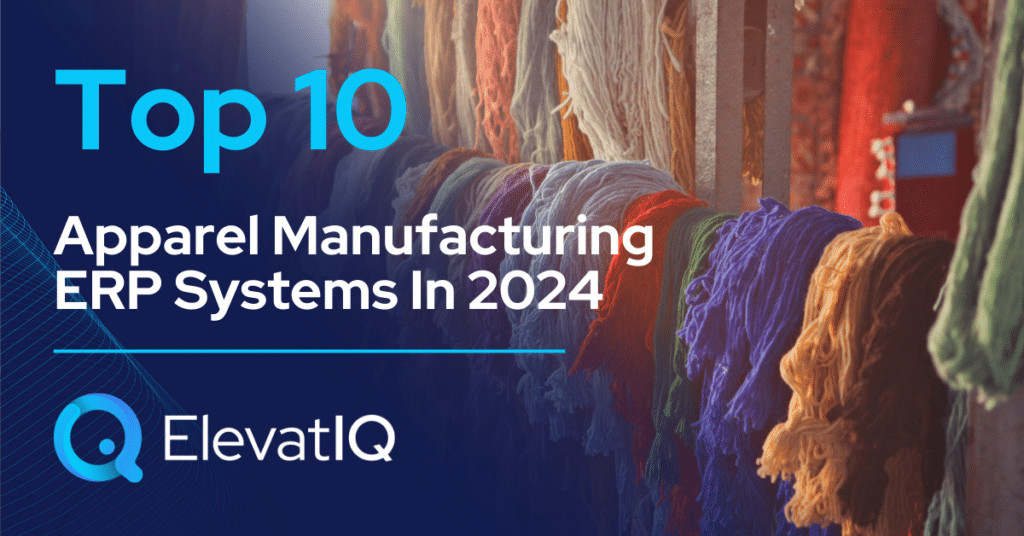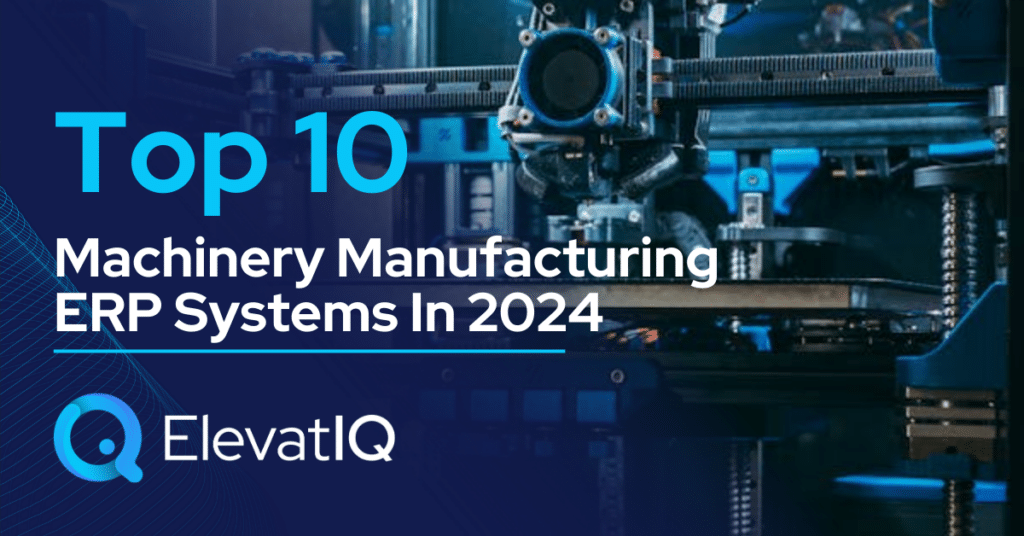Last Updated on November 27, 2023 by Sam Gupta
In this episode, we have our guest Chris Luecke from Manufacturing Happy Hour, who discusses several case studies where he has been involved in improving the manufacturing processes and making the plants smarter. He also touches on the basics and key advantages of smart manufacturing. Finally, he discusses the core challenges SMB companies face in growing their businesses.
Chapter Markers
- [0:00] Intro
- [3:02] Personal journey and current focus
- [4:05] Perspective on growth
- [5:04] Importance on communication and soft skills
- [6:19] Important skills for a podcaster
- [7:15] Manufacturing subject matter expertise in manufacturing marketing
- [9:25] How to convert from marketing expense to marketing investment?
- [12:24] Growth challenges for SMB manufacturers
- [18:56] Importance of standard operating procedures for SMBs
- [21:11] Smart manufacturing across different verticals
- [23:00] How to enable smart manufacturing at a facility?
- [29:28] Smart manufacturing trends
- [34:44] Closing thoughts
- [37:22] Outro
Key Takeaways
- When you have the manufacturing background, in addition to some marketing skills, that’s when you’re really able to communicate in a way that’s going to resonate with the person on the shop floor.
- When we talk about industry 4.0, digital transformation, smart manufacturing, we really focus on the big bang technologies like augmented reality and virtual reality. But really, we need to focus on the challenge first, and then we can talk about how augmented reality or something like that impacts that.
- Whether you are a contract manufacturer or the Med Device manufacturer, you need to first reflect on who I am selling to? Who is my ideal buyer persona, for example, and figure out the most common questions and most common challenges that person has?
- Whether I’m talking about cybersecurity, whether I’m talking about asset management, whether I’m talking about connecting devices, whether I’m talking about smart manufacturing, it really comes down to making sure you have the right people in place and then the right processes to take things on as well.

Subscribe and Review
Apple | Spotify | Stitcher | Google Podcasts | Deezer | Player FM | Castbox
About Chris
Chris Luecke is a Podcaster, Marketer, and self-proclaimed “Media Maverick” in the manufacturing industry. As the host of the podcast and video series Manufacturing Happy Hour, Chris interviews leaders in the industrial sector to simplify and explore the latest trends and technologies impacting modern manufacturers. Chris recently left his sales job of 11 years with Rockwell Automation to pursue podcasting and marketing full-time. He now helps manufacturers and other industrial companies create lead-generating digital content and build dedicated customer communities.
Resources
- Thanks for listening! If you’re a manufacturing leader or if you’re involved in the industry in some way, make sure to subscribe to Manufacturing Happy Hour on your podcast player-of-choice. You can subscribe and check out all episodes of Manufacturing Happy Hour at ManufacturingHappyHour.com.
- While you’re at it, don’t forget to join the Manufacturing Happy Hour Industry Community on LinkedIn. With over 300 members and monthly virtual happy hours, it is THE place for industrial innovators and go-getters to collaborate, share ideas, and make new connections.
- Connect with Chris
- Connect with Manufacturing Happy Hour
Full Transcript
Chris Luecke 0:00
They get hit by a truck the next day how someone going to pick up the slack for them. It’s probably going to take the next person that takes over twice as long, four times as long, 10 times as long whatever it might be to get that done. I mean, that’s the danger that someone’s in when they’re relying on tribal knowledge.
Intro 0:17
Growing a business requires a holistic approach that extends beyond sales and marketing. This approach needs alignment among people, processes and technologies. So, if you’re a business owner, operations or finance leader looking to learn grow strategies from your peers and competitors, you’re tuned into the right podcast. Welcome to the WBS Podcast, where scalable growth using business systems is our number one priority.
Now, here is your host, Sam Gupta.
Sam Gupta 0:54
Hey everyone, welcome back to another episode of the WBS podcast. I’m Sam Gupta, your host, and principal consultant. At digital transformation consulting firm, ElevatIQ.
Growing companies are obsessively efficient with their smart business processes. When it comes to making a manufacturing plant smart, there are limitless options available. Whether you talk about making your existing machines smart or upgrading your old machines, the smarter your plant is, the more efficient are likely to be your manufacturing processes, and the more cost-effective will be your operations.
In today’s episode, we have a guest Chris Luecke from manufacturing happy hour, who discusses several case studies where he has been involved in improving the manufacturing processes and making the plant smarter. He also touches on the basics and key advantages of smart manufacturing. Finally, he discusses the core challenges SMB companies face in growing their businesses.
Let me introduce Chris to you.
Chris Luecke is a podcaster marketer and self-proclaimed media Maverick in the manufacturing industry. As the host of the podcast and video series, manufacturing happy hour, Chris interviews leaders in the industrial sector to simplify and explore the latest trends and technologies impacting modern manufacturers. Chris recently left his sales job of 11 years, with Rockwell Automation to pursue podcasting and marketing full time. He now helps manufacturers and other industrial companies create lead gen campaigns, digital content, and build dedicated customer communities.
With that, let’s get to the conversation.
Hey, Chris, welcome to the show.
Chris Luecke 2:41
Good to be here, Sam. Thanks for having me.
Sam Gupta 2:43
I’m super excited to talk to you, Chris. I love your background because you have had so much experience in the manufacturing space. And obviously, our target audience is ops and finance. So, it’s always good to have that insight in terms of the work that you have done.
Chris Luecke 2:57
Absolutely, yeah, excited to talk to your crew today. The folks that listen to your show.
Sam Gupta 3:02
Okay, so before we get started, do you want to talk a little bit about your background and journey and what you are focusing on these days?
Chris Luecke 3:08
Sure, I’ll quickly introduce myself. So, my name is Chris Luecke. I am an industrial podcaster, for lack of a better word spent most of my career in sales and marketing for the past 11 years with Rockwell Automation. I’m a degreed engineer, and I recently took the leap to really focus on podcasting and start my own business. Helping manufacturers create content that converts into new leads new customers, and really helps them turn their marketing expenses into marketing investments that yield new business.
So that’s what I’m up to. My main show is called manufacturing happy hour. That’s what I’ve been focused on for the past four years. And it’s been a great opportunity to learn about industry 4.0 digital transformation, and really a lot of the challenges that manufacturers face on a regular basis and the type of solutions, the people, and the technologies that are out there to help solve those problems.
Sam Gupta 4:05
Great, thanks for sharing that. Now, I like to ask one more question pretty much with every single guest that I have. And that is going to be really the focus of our podcast, which is growth. So, what is your perspective on growth?
Chris Luecke 4:17
So, when I hear the word growth, I mean, obviously, as a salesperson, I think of top-line revenue and sales growth. But before we even get into that, I think about personal growth as well. And career growth. You know, I think in order, you know, and this is, again, coming from the perspective of someone that’s been in this business for about 11 years, primarily from a sales and marketing standpoint.
You know, I really think the way the more skills you’re able to develop, the more you’re able to figure out what you’re good at self-awareness, that’s going to help you with whatever your role is within a company, whether that’s in finance, whether that’s an operation, whether that’s in sales and marketing, once you’re able to hone those skills and build those as you grow personally. You’re going to be able to do more things that help your company grow financially.
Sam Gupta 5:04
So, what are some of the common skills that you see that everybody needs to have common skills that everyone needs to have?
Chris Luecke 5:10
Well, it’s hard to pinpoint, because every role is a little different. But I will say, and this was I was just doing a podcast interview last night, and my guest was reflecting on her experiences doing business abroad. And she’s like, you know, one of the things that really taught me was how to listen. And at the end of the day, whether you’re in the C-suite, whether you’re on the plant floor, whether you’re in finance, operations, etc., you’re going to need to know how to listen, because I think we all have an idea of how to share our ideas.
We all know how to talk. I’m a salesperson, you know, I think one of our one of our flaws is sometimes we do talk too much, but really listening and really empathizing with the person that you’re working with. That’s one thing that I think goes a long way, regardless of your role within an organization.
Sam Gupta 6:01
Yeah, I cannot agree more there. I think listening is way harder than talking to be honest. It’s so hard.
Chris Luecke 6:10
I mean, there’s, there’s not only what you hear. There’s also body language that goes with it. There’s a lot that needs to be paid attention to.
Sam Gupta 6:19
Totally right.
I know. And you have been doing the podcasting for a while, and you don’t really have the body language here with podcasting. So how can you make sure you’re still listening to the person on the other side?
Chris Luecke 6:31
Yeah, I think part of it comes into it, is having a plan for your podcast, having some like when I go to an interview, I kind of know some of the directions that I want the interview to go, you know, I do my research on my guest, I see what their experiences are.
But at the same time, you don’t want to be overly prepared that you miss an opportunity. If a guest brings up something really insightful, or a story that you weren’t aware of, you want to be able to dig into that you want to be able to hear them versus just being like, okay, thank you for answering my question. On to the next question. You want to be able to veer from your planned path if it’s going to add value. And a lot of that comes from being able to listen to your guest and what they’re saying.
Sam Gupta 7:15
Seriously, I mean, I cannot agree more. Nobody wants to talk to a robot. So, you are so right there. Now, I’m actually going to move to the next question related to your comment about the degreed engineer. So, tell me I mean, you are doing obviously sales and marketing, and you have a very deep background in terms of having this engineering degree. And then you did a lot of manufacturing fields.
So obviously, you have very deep expertise in manufacturing. Why is it important to have the manufacturing expertise for sales and marketing when you are selling to a manufacturer?
Chris Luecke 7:50
Sam, that is a fantastic question. I think what it comes down to is really being able to relate to and empathize with your you know, your customer’s audience, at the end of the day, you know, when I work with people that are trying to reach a particular customer audience, whether that’s an end-user, whether that’s an equipment manufacturer, you know, located in X region of the country, we really, you know, what’s important to know is what does that engineer at the end of the table go through on a regular basis, what are the challenges they face every day when they step out on the shop floor, for example. And, I’m talking about speaking to a technical audience right now.
Chris Luecke 8:34
But I think, when you have that manufacturing background, in addition to some marketing skills, marketing savvy, that’s when you’re really able to communicate in a way that’s going to resonate with the person at the other end of the table. You know, for example, like, I know how technical a guy on the shop floor is going to want to speak and engineer on the shop floor is going to want to speak.
At the same time, I want to make sure when I present an idea, it’s in an approachable fashion where it’s not overly over the top overly technical, you want it to be something that they’re going to get the idea pretty quickly. So, it’s being able to balance you know, some of those hallmarks of communication, communicating in threes, three bullets, whatever that is, but also being able to speak the language and, you know, empathize with the challenges that someone is experiencing, that has to use these technologies on a regular basis.
Sam Gupta 9:25
Yep, could not agree more with respect to having that that subtle depth that is required in a stream, but at the same time, it needs to be high level as well.
So now I’m actually going to move to the next topic that you mentioned, which is going to be converting from marketing expense to marketing investment. So, tell me your perspective of what is marketing expense, the people who don’t know what an expense is, what is more than investment as far as marketing is concerned, can you touch more on that?
Chris Luecke 9:54
Sure. And this is really from my perspective, as a sales guy. You know, my marketing Experience is limited to me being in sales. And I don’t think that’s a bad thing. Because the reality is when I’m thinking of marketing, I’m thinking of Okay, what’s going to what, how is this piece of content? Or how is this tradeshow we’re participating in? How is that going to turn into a lead that could turn into an opportunity that could turn into new business?
So what I mean by marketing expense and marketing investment, I’m glad you asked this question is, I think, for many, many years, even now, especially as we’re doing virtual trade shows, a number of companies look at, you know, investing in, let’s say, a booth at a trade show, for example, this is an easy one as something they just have to do, you know, to maintain their brand to show face at whatever the big industry trade show they’re participating in, they’re looking at it just as an expense they have to spend, they’re not always thinking in terms of Okay, how is this going to translate into a new customer? You know, yes, there’s the lead collection that takes place at these events.
Chris Luecke 10:56
But when it comes to, let’s say, something like social media or content, I don’t necessarily see people thinking of it’s like, hey, what is what, you know, how are we going to get this to turn into a customer? I think part of that starts with one getting the content, right making, it’s making sure it’s something that when someone is scrolling LinkedIn, for example, when they see a 45 second video, is it something that’s going to get someone to stop scrolling to be like, wait, I need to listen to this, because I’m having challenges, you know, recruiting the next generation within my business, for example, or I’m having challenges addressing the skills gap, you want to make sure you’re putting content out there that addresses challenges in the way, you know, the challenges that your company is able to help other companies solve.
So, you know, Rockwell Automation is an example I worked there for 11 years, they help companies connect their enterprise, they help companies get data that allows them to make better manufacturing decisions that impact the bottom line. So, the reality is, people need to be thinking about when I’m creating this content when I’m investing to be at this trade show. Is this really an investment?
Or is this just something I’m paying for because it’s something I’ve always done? So that’s where I think people really need to be shifting that mindset of, hey, let’s not just make these expenses, marketing is actually going to be an investment that drives our business forward.
Sam Gupta 12:24
Okay. That’s a great perspective. I love that insight. Now, Chris, since you have worked with so many different SMB customers, especially in the manufacturing space, I would like to hear your perspective about overall, you know, manufacturing landscape, if you’re thinking from the growth perspective, obviously, you know, sales and marketing is great.
Those are the problems that are always going to be there. But from your perspective, let’s say if we look at the landscape of small to medium-sized businesses, 90% of them, it’s very hard for them to grow. So, what are some of the core challenges that they are facing at this point in time to cross that chasm, core challenges for small, medium-sized businesses to grow?
Chris Luecke 13:05
Well, it’s interesting that you bring this up because as I was preparing for this conversation, I was really thinking about some of the things that I’ve done with Rockwell Automation, as well as some of the lessons that I’ve learned from my podcast.
And, you know, I’ll start with, with my experience at Rockwell, you know, I was when I left, I was basically calling on equipment manufacturers in the greater Bay Area, and the challenges that I saw them coming across, we’re reaching more customers, a lot of times, you know, small to medium, a large company like Rockwell, for example, has a brand name people know about them. People know how to find Rockwell, that’s not always the case, with a small to medium-sized business, that findability is one of the first things they need to solve. Not just findability, but their differentiation as well.
Chris Luecke 13:59
So, you know, we talk a lot about digital transformation, industry 4.0 on my podcasts, and, you know, a challenge that I saw as an equipment manufacturer, a small to medium-sized business, like one of them was, how do we add something to our machine that allows us to upsell add value versus, you know, having to cut our price to compete with the people that we’re up against.
And, as a Rockwell account representative, those things could be anything like cloud-based analytics solutions, you’re going to be able to help your end customer get information quicker, or something like connected sensors, smart sensors, things that allow you to pull more data that again, allow an end-user to make decisions quicker.
So, you know, from a Rockwell perspective, working with equipment manufacturers that I’d say qualifies small and medium-sized businesses, finding ways to add value add features that would allow them to impact their top line in their state.
Chris Luecke 15:00
And in turn, win more business. That was one of the core challenges I was seeing. But overall, when I think of, you know, I know I’m going down a smart manufacturing path here, you know, I think of smart manufacturing, as what are the technologies that really help solve the biggest problems that most manufacturers, especially small to medium-sized ones are facing, you know, baby boomers are retiring, there’s going to be a generation gap. There’s also a skills gap, there aren’t as many people to address some of these critical trades for advanced manufacturing roles.
And then, you know, being able to procure large equipment, those are, you know, these are things that I’ve come across on the podcast before that, you know, as a smaller, medium-sized business might not have the same capital dollars as a large organization. I see that as a potential challenge as well. So, plenty of stories I could go into around these. But, you know, I’ll go back to my first answer of helping companies differentiate themselves, so that way they’re selling on value versus trying to cut their costs.
Sam Gupta 15:59
Yeah, so definitely, we want to touch you know, more on the stories, I think that’s what is going to help our audience visualize the automation initiatives that you have taken or digital transformation initiatives that they have taken. And that has had a real impact on the growth and the P&L.
So, do you have any specific story that you may want to talk about? So, let’s start with where they were before you got introduced to an account? Okay, what you did? And what was the impact after doing whatever you did?
Chris Luecke 16:34
Yeah, you know, one, one thing that and this is kind of a tertiary story in some regards, but I’ll talk to an industry that I served out in the Bay Area, and one of the cooler solutions that that one of my peers had come across in the space.
So, I mentioned that with smart manufacturing and, and baby boomers retiring, your critical thing is getting the next generation or the new people stepping on the shop floor, getting them trained. The reality is training takes a lot of time. And it takes a lot of dollars. And I think a lot of times when we talk about industry 4.0 digital transformation, smart manufacturing, we really focus on the big bang technologies like oh, augmented reality, virtual reality, that’s cool. But really, we need to focus on the challenge first, and then we can talk about how augmented reality or something like that impacts that. So, I’ll give an example.
Chris Luecke 17:25
And this is a case study that your audience can search for it’s out there, large semiconductor company called Global Foundries, they were looking for a way to better train their employees cut down on their training time, you know like I said, the older generation is starting to retire, there’s a solution out there called de forea. Expert capture that not a Rockwell solution, per se, but our partners at PTC, they do that it’s an augmented reality solution for standard operating procedures, essentially, it shows people that are on the factory floor, assembling equipment, or going through some process exactly how to do what they do.
The reality is the results, I think this cut down on their amount of standard operating procedures they had or the amount of time it took them to create a standard operating procedure by like 10x, and it cut training time in half as well.
Chris Luecke 18:16
And, you know, for the CFO audience out there that’s listening to this, you can apply the dollars that that makes, you know, to your particular business, whether that’s a small or large business at the end of the day, you know, that’s where I really think the beauty of industry 4.0. And these new technologies come into play.
Because this is where augmented reality, you know, has been able to see what you’re doing. When you’re putting a widget together, for example, being able to see that and then translating that into a tool that you can replicate that process over and over. That’s where augmented reality becomes cool. So, a quick example from the industry that I served. Hopefully, that helps add some perspective to that.
Sam Gupta 18:56
Okay, amazing. So, since you mentioned the word standard operating procedure, and that should be very common in the manufacturing sector. But when we work with a lot of small manufacturers, they don’t even have a defined process. Okay, they don’t have their documented BOMs that they use for their manufacturing.
Okay, so if you are, let’s say, working with this kind of manufacturer, who does not have the defined procedures. So, what would be your advice for them from your perspective? And what do you think they are missing by not having the standard operating procedure?
Chris Luecke 19:34
In terms of what they’re missing, I mean, some of these are major things like you’re it’s, we call it the Guinness truck scenario, like if Joe or Sally that works on this equipment all the time, if they get hit by again his truck The next day, how someone going to pick up the slack for them, it’s probably going to take the next person that takes over twice as long, four times as long, 10 times as long, whatever it might be to get that done. That’s the danger that someone in when they’re relying on tribal knowledge without any documentation. That’s, you know, for what I would say, you know, look to see if you can invest in a technology solution like that.
Chris Luecke 20:13
And just based on, like the example I just gave, figure out what the ROI of that technology solution might be, if it can help with standard operating procedures, at the bare minimum, start capturing those in some sort of, I don’t want to say Excel file per se, because that’s just as difficult to, to keep track of, but something that can be put into that, assuming that company has a business system, you need to, I would say the business, what the business needs to do is figure out where they are, do you have some sort of overall software within your company where you can log this type of information?
If not, can you at least write it down to get that procedure in place? Do you have the money to invest in that? And is there good ROI on that, those are the steps I’d take, the company needs to be self-aware of if they have those systems, but at the very least start writing it down? So that way, when you do implement something more robust, you have something to go off of versus just starting from tribal knowledge. When that day comes. Okay, amazing.
Sam Gupta 21:11
Let’s talk about some of the manufacturing verticals. So, you know, from your perspective, do you believe that when you go from one vertical to the next, let’s say, we are going from the machinery to custom manufacturer or the contract manufacturer, or it could be Medical Device? Does the approach differ across these verticals?
Chris Luecke 21:38
I think the content and the challenges are going to differ a little bit, but the reality is the process of coming up with that is going to be the same, you know, whether you are a contract manufacturer, or whether you’re the Med Device manufacturer, you need to first reflect on, who am I selling to? Who is my ideal buyer persona, for example, and figure out what are the most common questions and most common challenges that person has this is, in many ways, this is marketing 101, in a lot of ways?
And then from there, you work back to, you know, figuring out what, what type of, you know, how do we get the right messages in front of them? I think you, you know, for example, you and I, before this interview, we were chatting about, you know, pay-per-click and campaigns and things along those lines, I think there is a gap where people know some of these marketing tactics, but they often jump to those before making sure they get the content, right, that can actually reach and resonate with the people they’re trying to get out to.
So, to answer your question is as quickly as possible, the basic principles remain the same figure out who you’re selling to, and who their challenges are, what they are, what their challenges are, what their questions are. But depending on the industry, those challenges, those questions are going to be unique to that industry, but the process you need to follow is the same.
Sam Gupta 23:00
Okay, and since you are talking a lot about smart manufacturing, and I want to dig deeper into that, yeah. Okay. So, let’s say if you work with a customer, that wasn’t so smart, so tell me how that was? Why they were not smart. What was the state of the site? So, let’s say if I’m walking down the site, how did the site appear? You know, just by looking at the machines just by looking at the process. So, help me visualize that, in them, what changes you made? And how that turned into a Smart factory or a smart site?
Chris Luecke 23:36
So good, big, big question. I can answer this from what’s the more from the machine builder standpoint since it’s been a long time since I’ve been working with the factories themselves? But you know, I think, and I guess that the other thing I’d say is, I would never say someone’s factory is not smart, or they’re not smart, I’d make sure to be more gentle within the conversation.
It comes back to people processes and technologies. But I mean, those are the basics that whether I’m talking about cybersecurity, whether I’m talking about asset management, whether I’m talking about connecting devices, it really comes down to making sure you have the right people in place and then the right processes to take things on as well. You know, when I’ve worked all answered this kind of from the sales guy perspective a little bit you know when I’ve worked with folks before from, you know, developing a strategy that would help an equipment manufacturer sell more equipment, I kind of look to see it’s like, what are you doing to market to reach your audience and things like that, you know, I start with who are the people that can help get that message out there.
Chris Luecke 25:01
So same thing goes on the factory floor, if I’m walking a plant floor, or if I’m doing a cybersecurity assessment, for example, I’m looking to make sure you have people that are assigned to the right tasks like patching, like security management things along those lines, you know, once you have the people in place, you get them to put the right processes, and then you can start implementing the right technology.
So, I’m taking a bit of an alternative answer to what you’re asking. But, you know, when I think of walking a plant floor, seeing something that’s not right, that could be improved. Before I even tried to diagnose a technology that could help solve that problem. I want to know what the people and processes are behind that to make sure that’s addressed first, because otherwise, you know, I can I, you know, speaking from a Rockwell standpoint, I could sell a controller, I could sell a drive, I could sell a panel, I could sell an information solution product. But if you don’t have the right people behind it to really enable that, then you know that that’s an investment that, as I said, might not be the investment or the ROI that you’re looking for.
Chris Luecke 26:34
I think in the brewing industry, the brewing industry is a great one, when you think about automating that one, like automating the recipes, when, you know getting the making sure the temperatures are right when to add the right stuff. Like that’s, that’s an industry where especially craft brewing, you know, you’re bootstrapping a lot of those companies, for example, and I’m going to the brewery, I’m looking to see where I’m like, hey, you know, are you thinking of putting in a solution that really the easiest way to phrase it, it’s like it can help you make sure in like a whole batch of beer does not go bad, because you don’t want it to, you know, boil at the wrong temperature, ferment for too long at the wrong temperature that can cause off-flavors.
So, you know, a recipe management solution is something I’m going to be recommending there. It’s more going to be a consultative approach along the lines of, hey, have you thought about putting in some sort of automation that swaps out those paper records? And has those automatically logged in the system for you, and then starting the conversation from there, I think that’s where I go with that, Sam.
Sam Gupta 27:43
Okay, and I’m not sure if I’m touching the sensitive topic here or the confidential because I can see a lot of posts from you on social media, like related to a craft brewery and brew beer, your target market next target market from your marketing agency perspective.
Chris Luecke 27:57
I will say the credit to the craft brewing industry, I’m glad it falls into the manufacturing category because I personally love beer. I’ve enjoyed working with them before I actually have a second podcast called PubCast worldwide, where we just talk about the beer industry.
So, no doubt they are certainly someone I’d love to have as one of my clients. And you know, it’s, it’s a space I understand. I didn’t mention this. But before my time at Rockwell, I worked for Anheuser Busch, I was on their canning side of the business. But you know, when you’re part of that, when you’re part of that family, for lack of a better word, you certainly see the brewing industry so it’s an industry I find a lot of fun. I love the people that work in that space. So no, this isn’t given anything away at all. For someone that has a podcast called manufacturing happy hour, it would be a crime if that person did not put some craft brewing industry.
Sam Gupta 28:49
Oh, my goodness, you have a tough choice to make there. You have to choose between a smart machine versus a craft brewery, which one is going to be your choice?
Chris Luecke 28:58
I would probably say let’s put a smart machine in the craft brewery that’s probably you know, these, these brewhouses have a lot more intelligence than they used to. So, I just tried to meet in the middle right there.
Sam Gupta 29:10
That’s a great idea, but it’s probably going to be screwed-up marketing. Because of the mixed marketing message.
Chris Luecke 29:17
Maybe well, I’m willing to make you know, with any new venture mistakes need to be made. I’m willing to make some mistakes as I go through that. So, well. We’ll see what happens.
Sam Gupta 29:28
Okay, so tell me some more stories. I think you wanted to share some horror stories. And I don’t know if we were able to cover all of those stories. So, do you have any that you wanted to discuss in this episode?
Chris Luecke 29:38
Yeah, I do. So, I’ve got a couple more that all go out there just to talk about smart manufacturing from a couple of other standpoints. Because going back to my point, let’s think about smart manufacturing as a new tool. We have to address the biggest challenges in manufacturing. Let’s think about what the problem is first, and then let’s look at how these tools are able to solve it. And, you know, the cool thing is we’ve talked a lot about my Rockwell experience so far, but I encounter a lot of cool solutions by being a podcaster.
As well, I think that’s been one of the advantages. It’s just being able to hear what other people are up to. You know, for example, one of the coolest episodes I did in the past year was with an app called variable speed VRYAB, a very good company. So variable, they, they build themselves, I hope I get this, right, it’s like the Uber for the factory floor.
You know, we’re talking about the bottom line, top line, and CFOs here, you know, this is a solution where, you know, imagine like the same way you call an Uber, you click a button, you’re like, hey, I need a ride to get me here and get me at this place at this time. Let’s say you run a warehouse, or you run a manufacturing facility, and your production is up, it’s a holiday season, right now, when we’re recording this interview.
Chris Luecke 30:54
So, you know, people have production ramped up for certain things to get more product out the door, you know, if you want, if you have, like, let’s say, a variable operation like that, where you need to hire folks, for peak seasons, this is an app where you can go into, you can say, hey, I need an operator, I need a tradesman.
With these skills, you can, and can search for someone in that area that you can hire on an as-needed basis. And you know, again, think of it as Uber, this is as much of an advantage for an operation that needs to pull on some temporary work as it is for the person looking for temporary work, you know, the way my guest described it, he was interviewing a mother of four that you know, I’m sure ours are kind of, you know, they’re, they can’t be consistent, she used to take care of her family.
But using this app, she’s able to get the right gigs at the right time. So, you know, I love talking to solutions like that, like an app that’s been created the same, you know, the same way that we use for something in our daily lives, how it applies to addressing a critical manufacturing issue, like filling the skills gap.
Chris Luecke 31:55
And then, you know, just one other example, before I hand it back to you, you know, as I’ve made the jump from being full time with Rockwell to serving other companies, one of the first groups I’m working with is a company called SteamChain, and also again, a guest on my podcast from a year ago, where they’re really changing up the way people procure capital equipment, you know, we think about the procurement model, where you pay a large sum of money for a piece of equipment, and then the end-user owns that equipment outright.
But, you know, the equipment manufacturer that sold the equipment they’re on in the next job, you know, the reality is there are ways like to sell this equipment as what SteamChain calls machine-as-a-service.
Chris Luecke 32:37
Think of it like others as the service industry, as the office printer space, no one really buys a Xerox printer anymore, they have it in their office, they’re paying for its usage. The same thing can go for a piece of factory equipment, it requires a bit of a mental paradigm shift.
But man, if I’m a CFO, or I’m an operation, and I’m thinking of Wow, how can especially if I’m a small to medium-sized business that needs to buy capital equipment, I probably don’t have the same capital dollars that someone like a Craft, or 3M has, like this is a way that you can pay for equipment based on performance and usage, instead of having to incur that CapEx dollars.
What this does, you know, I find it to be a cool solution because then it enhances that ongoing relationship between the OEM and the end-user, the OEM is now incentivized to stay in touch with that customer, help them get throughput because they get paid on the performance of that equipment, you know, and the end-user, now they’re able to acquire that piece of capital equipment without having to pay the upfront dollars.
So, the reality is just seeing how smart manufacturing smart industry 4.0 solutions are really, you know, improving collaboration, impacting bottom lines impacting top lines, and just making life easier, and more productive for all the parties involved. That’s something that I’ve found pretty cool.
Sam Gupta 33:57
Well, because I’m gonna have to admit here, this is, this has been one of the coolest conversations that I have had in my podcast. So, thank you for that. And when I look at this episode, overall, I would say, you know, I definitely appreciate that in anyone, especially marketers, when they can talk manufacturing when they talk engineering. So, I’m super excited to see you making that step and doing the marketing agency that step that you are going to take. So, I’m super, super pumped, and excited about that.
Chris Luecke 34:29
This has been a fun conversation. It’s been cool to spitball and some of the favorite solutions I’ve seen in the manufacturing space, whether it’s through Rockwell or through my time as a podcaster.
Sam Gupta 34:41
Okay, amazing. Do you have any last-minute closing thoughts?
Chris Luecke 34:44
The only thing I’d say is, you know, for way too many people to connect with me. I’m super active on LinkedIn. You know, in addition to Manufacturing Happy Hour being a podcast that I’d encourage people to subscribe to on their platform of choice. You know, I think that the biggest thing behind it that that keeps it so fun and so impactful is that we also have a LinkedIn community of 300 Manufacturing leaders, it’ll probably be more by the time this podcast airs.
But people that are really just interested in helping others advance their career, enhance their businesses, it’s a great networking tool for, you know, at least here in 2021, we’re all stuck at home, probably into 2021. A little bit. It’s a great way to connect with other forward thinkers in the manufacturing space.
And the easiest way to get there, ManufacturingHappyHour.com/community which will take you straight to our group on LinkedIn. And I’d love to love to have anyone listening that that’s a forward thinker in the industrial space join or you know, someone that’s more forward-thinking in the B2B space in general. We’ve got a great crew there, and we’re always looking for more great people.
Sam Gupta 35:49
Okay, amazing. Thank you so much for your time. Really appreciate it. This is great.
Chris Luecke 35:52
Sam, Thanks a ton.
Sam Gupta 35:55
I cannot thank our guests enough for coming on the show for sharing their knowledge and journey. I always pick up learnings from our guests, and hopefully, you learned something new today. If you want to learn more about press head over to ManufacturingHappyHour.com. You can also join the LinkedIn community by going to ManufacturingHappyHour.com/ community. With over 300 members and monthly virtual happy hours, it is the place for industry innovators and go-getters to collaborate, share ideas and make new connections, links and more information will also be available in the show notes.
If anything in this podcast resonated with you and your business, you might want to check other related episodes, including the interview with Curt Anderson, from B2BTail, who touches on what custom manufacturers need to know about starting their e-commerce journey. Also, the interview with Jason Chester from InfinityQS where we discussed the challenges today’s manufacturers face with changing consumer behavior.
Also, don’t forget to subscribe and spread the word among folks with similar backgrounds. If you have any questions or comments about the show, please review and rate us on your favorite podcasting platform or DM me on any social channels. I’ll try my best to respond personally and make sure you get out.
Thank you and I hope to catch you on the next episode.
Outro 37:22
Thank you for listening to another episode of The WBS podcast. Be sure to subscribe on your favorite podcasting platform so you never miss an episode. And for more information on growth strategies for SMBs using ERP and digital transformation, check out our community at wbs.rocks. We’ll see you next time.


